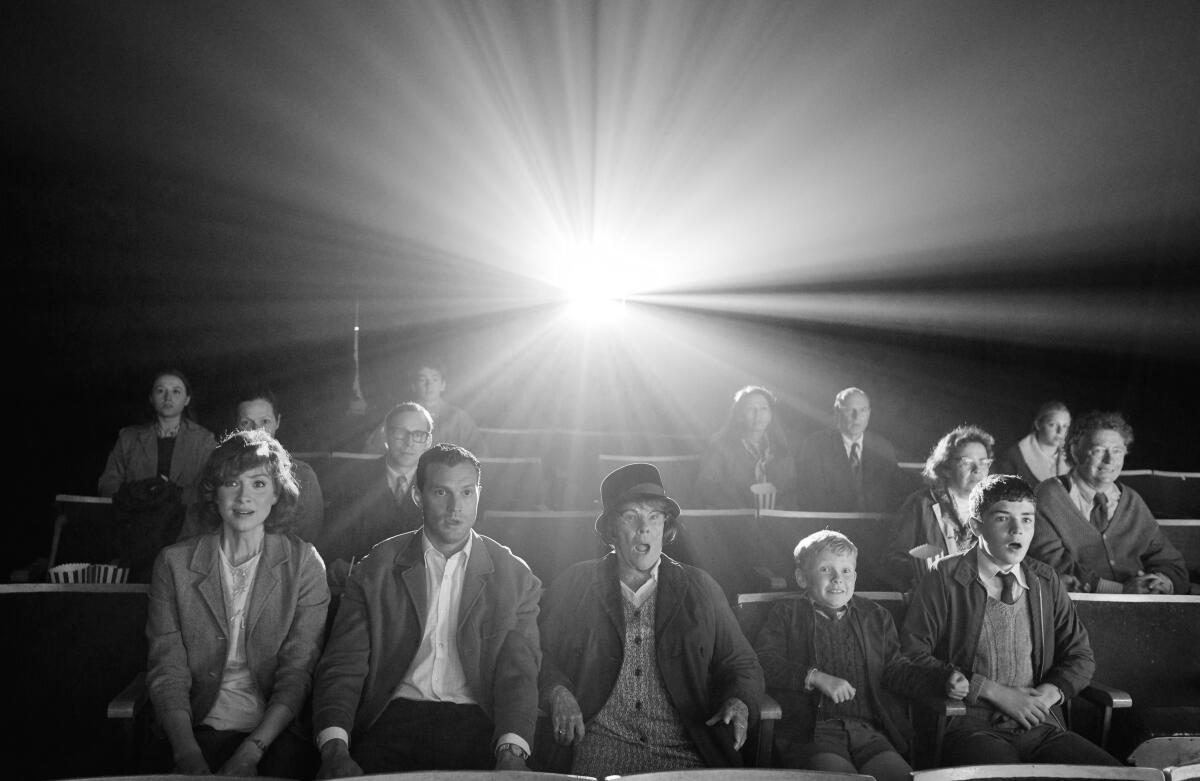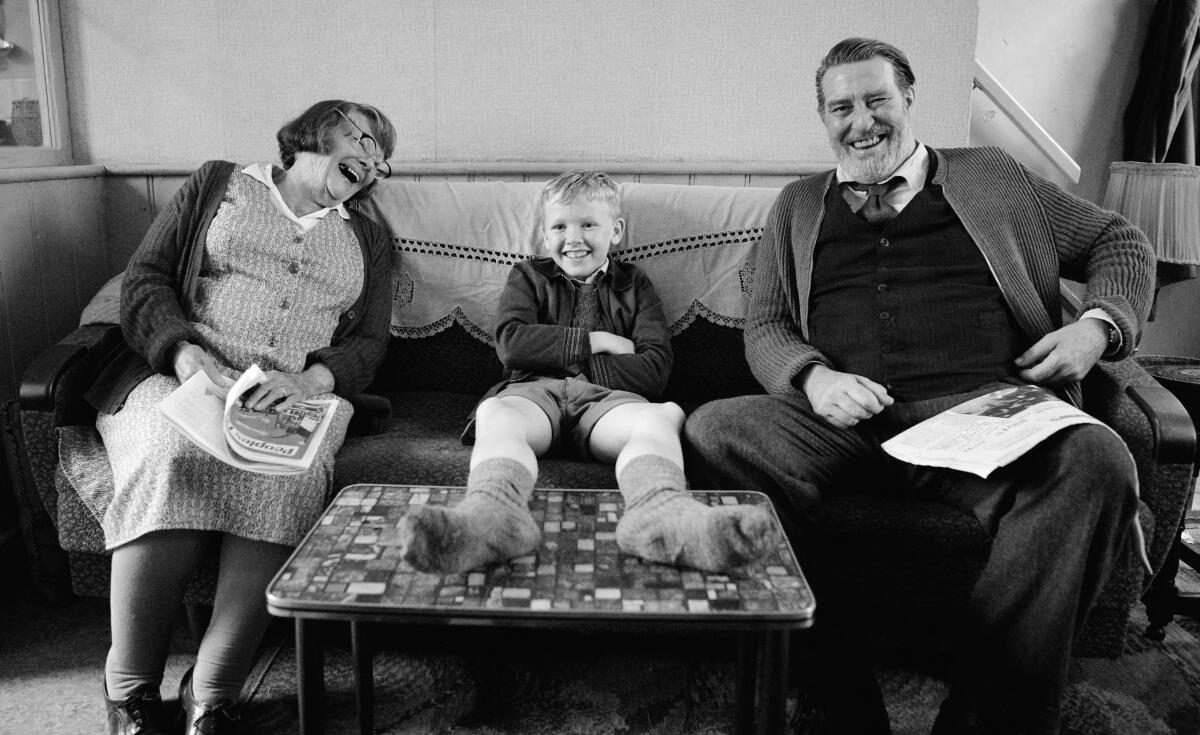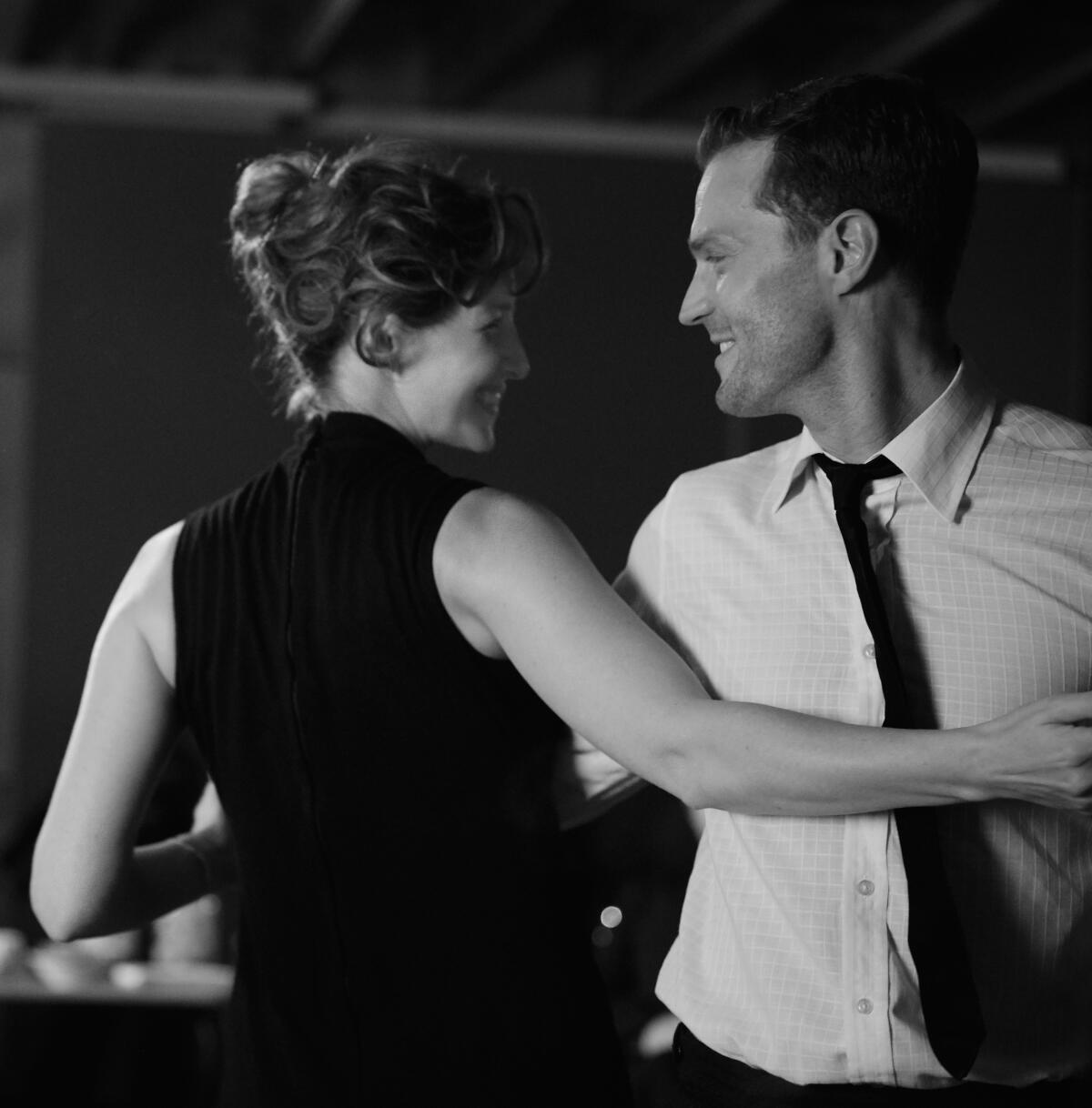Review: Kenneth Branagh’s ‘Belfast’ is a personal but muted story of childhood’s end

- Share via
The Times is committed to reviewing theatrical film releases during the COVID-19 pandemic. Because moviegoing carries risks during this time, we remind readers to follow health and safety guidelines as outlined by the Centers for Disease Control and Prevention and local health officials.
More than once during “Belfast,” Kenneth Branagh’s wobbly crowd-pleaser about his tumultuous early years in Northern Ireland, the characters sit back in a crowded movie theater and find themselves enraptured. We see their faces beaming up at the screen, backlit by the projector beam and bathed in the glow of images from “One Million Years B.C.” or “Chitty Chitty Bang Bang,” both excerpted here in all their bright-hued glory. The colors especially stand out because the rest of “Belfast” was shot in black-and-white (by director of photography Haris Zambarloukos), which is to say that this brisk coming-of-age yarn is also a self-conscious ode to the magic of the movies.
Branagh, making a rare foray into personal territory in a career that stretches from Henry V to Hercule Poirot, is hardly the first British filmmaker to engage in this kind of meta-cinematic origin story. You may recall similarly formative moviegoing scenes from John Boorman’s “Hope and Glory” or Terence Davies’ “The Long Day Closes,” with their early glimpses of a future steeped in the pictures. “Belfast” has a few other things in common with those masterly memoirs, chiefly its warm, humorous scenes of family life, glimpsed from a child’s-eye view that drifts between perceptive and confused. And to judge by its early acclaim (it won the top audience award at the Toronto International Film Festival), it’s having the same enrapturing effect on some audiences that Dick Van Dyke and a flying car had on the young Branagh himself.
I’m still figuring out why it didn’t have that effect on me, while also keeping in mind that there is, of course, only one “me” that really matters in this dramatic equation. Branagh alone knows the degree to which this movie, made with a little faith and clearly a lot of love, reflects the particulars of his childhood. Watching “Belfast,” you may wonder if the young Branagh — imagined here as a sweet, wide-eyed 9-year-old named Buddy (Jude Hill) — really was banging on a garbage pail in the summer of ’69 when fighting erupted in the streets, sending neighbors ducking for cover as Molotov cocktails exploded around them. You may also wonder about the real-life inspirations behind certain subplots, like Buddy’s crush on the smartest girl in his class or a failed shoplifting attempt. (I’m guessing there’s more than a grain of truth to the shot of Buddy reading a Thor comic book, an amusing nod to Branagh’s future bout with the Marvel Cinematic Universe.)

Whether or not these things happened is beside the point, not just because storytellers are entitled to some artistic license, but because this particular story unfolds in the shadow of such a stark, implacable reality. The sectarian violence that ripped through Northern Ireland from the late ’60s through the late ’90s was all too real for those who survived it and for the many who didn’t, and the fiery opening scenes of “Belfast” suggest a desire to bring us as viscerally close to the experience as the movies will allow. But an artist’s cinematic self-reckoning is another story, one that often thrives in that narrative limbo between truth and fiction — and also, as “Hope and Glory” brilliantly demonstrated, between extreme peril and gentle whimsy.
And there is a little whimsy, or perhaps a touch of blarney, in “Belfast,” though you can sense Branagh hard at work, straining to keep every impulse toward cutesiness in check. The tone is stringently measured. Mirth mingles with melancholy; as Buddy’s gently bickering grandparents, Ciarán Hinds and Judi Dench hit just the right notes of treacle and vinegar. Buddy himself is equal parts precocity and mischief, and he and his teenage brother (an underused Lewis McAskie) sometimes test the patience of their mother (Caitriona Balfe), who’s positively radiant in her salt-of-the-earth dishevelment. Their father (Jamie Dornan) is a lovable if less stable presence, prone to gambling away his meager earnings from working as a skilled laborer in England. “Be good,” Pa tells Buddy during one of his visits home. “And if you can’t be good, be careful.”
It’s shrewd advice. The ethno-religious tensions erupting just outside their shattered windows — fanned by a cartoonishly menacing Protestant gang leader (Colin Morgan) who tries to recruit Buddy’s family in his anti-Catholic campaign — threaten to undo their cozy domestic haven. Buddy is unnerved, but also confused: He doesn’t understand why he and his Protestant family suddenly have to hate their confession-going neighbors, and his decent, compassionate parents don’t get it, either. (An amusing fire-and-brimstone church sermon more or less sums up the movie’s wryly tolerant attitude toward religion.) As the violence escalates, Buddy’s father wants to move the family to greener pastures abroad, though his mother can’t imagine leaving the only home they’ve ever known.

It spoils nothing to note that Branagh and his family did end up moving to England, and that “Belfast” is thus a tale of childhood’s end, a willed immersion in a time and place that will soon exist only in its characters’ memories. But for all the specificities of that time and place — a neighborhood where a brick-lined alley serves as a yard and an outhouse toilet becomes an armchair — it’s rendered here with a curious lack of real, lived-in texture. It’s unsurprising to learn that the movie was largely shot on a street set (the pandemic made filming in the real Belfast too difficult), which may explain the overly pristine look of its cobblestoned streets and row house interiors. Branagh, seldom an intuitive composer of images, frames the action from bizarrely canted angles that further frustrate the movie’s already uncertain point of view. Black-and-white may be convenient visual shorthand for the past, but there’s something flat and inexpressive about these images, scrubbed of grit and buffed to a sharp digital gloss.
Something similar could be said of the movie-star faces of Balfe and Dornan, though good actors make their own rules: Their beauty is commensurate with Buddy’s worshipful view of his parents, and it’ll take a stonier heart than mine to resist Pa’s sweet rendition of “Everlasting Love” (one of the few songs on the soundtrack not performed by that Belfast rock legend Van Morrison). Balfe and Dornan are bracingly warm screen presences, even if their characters, like nearly all the characters in “Belfast,” are basically idealized sketches. Personalities don’t have to leap off the screen for a story to hold your attention; sometimes a filmmaker’s mise-en-scène or attention to details will be evocative enough to bring you fully into their world. If that doesn’t work, they can always fall back on tear-jerking bathos and sentimental clichés.
“Belfast,” to its partial credit and ultimate detriment, seems reluctant to embrace any of these possibilities. The closing beats are persuasive, if predictable: There’s a climactic showdown, a whisper of tragedy and a sense of closure as the characters embrace a sadder but potentially happier future. Buddy himself remains an endearing blank, a willing absorber of lessons — about the importance of decency and the futility of violence — that are as obvious as they are inarguable. I can’t say that “Belfast” is especially good. But it is nothing if not careful.
‘Belfast’
Rating: PG-13, for some violence and strong language
Running time: 1 hour, 37 minutes
Playing: Starts Nov. 12 in general release
More to Read
Only good movies
Get the Indie Focus newsletter, Mark Olsen's weekly guide to the world of cinema.
You may occasionally receive promotional content from the Los Angeles Times.











